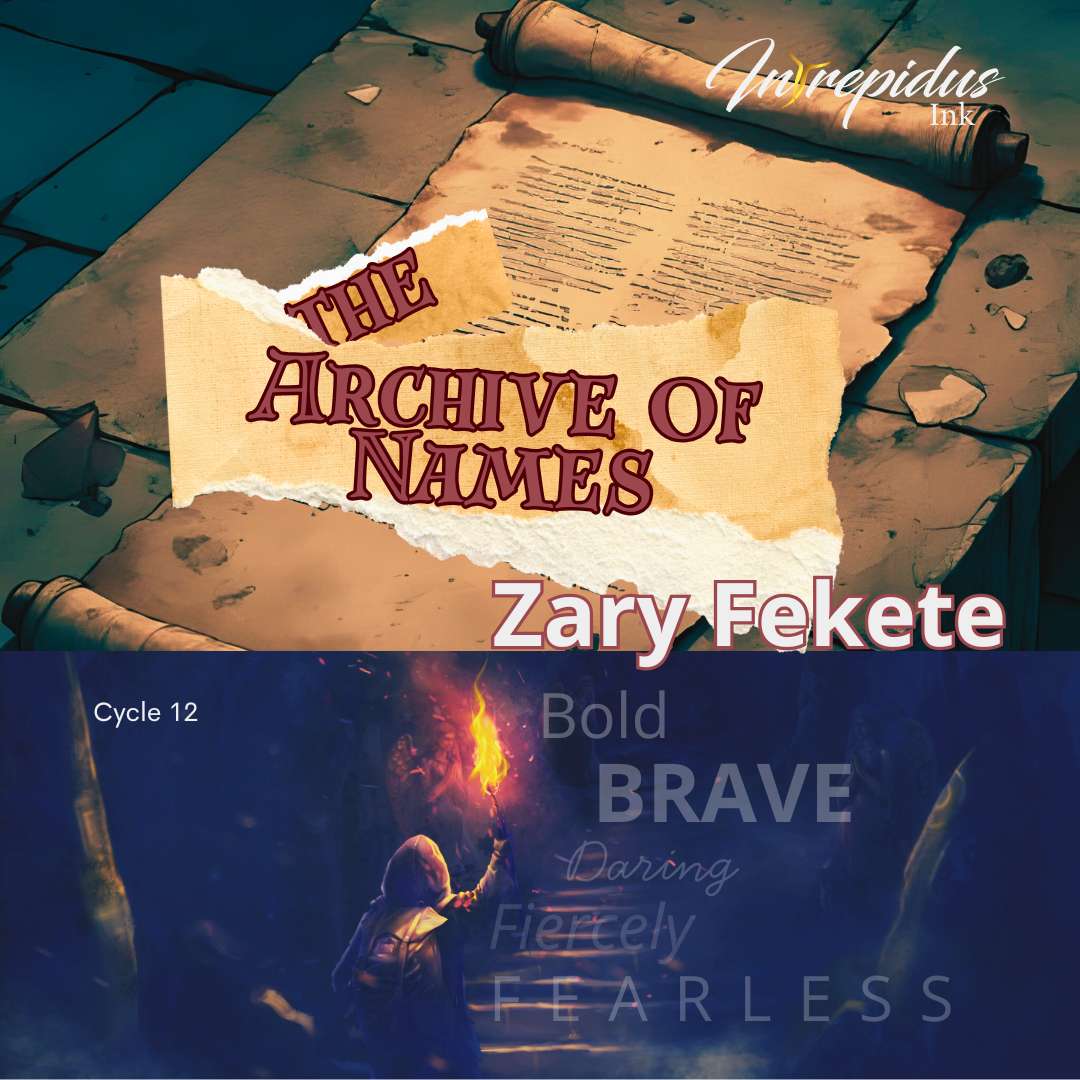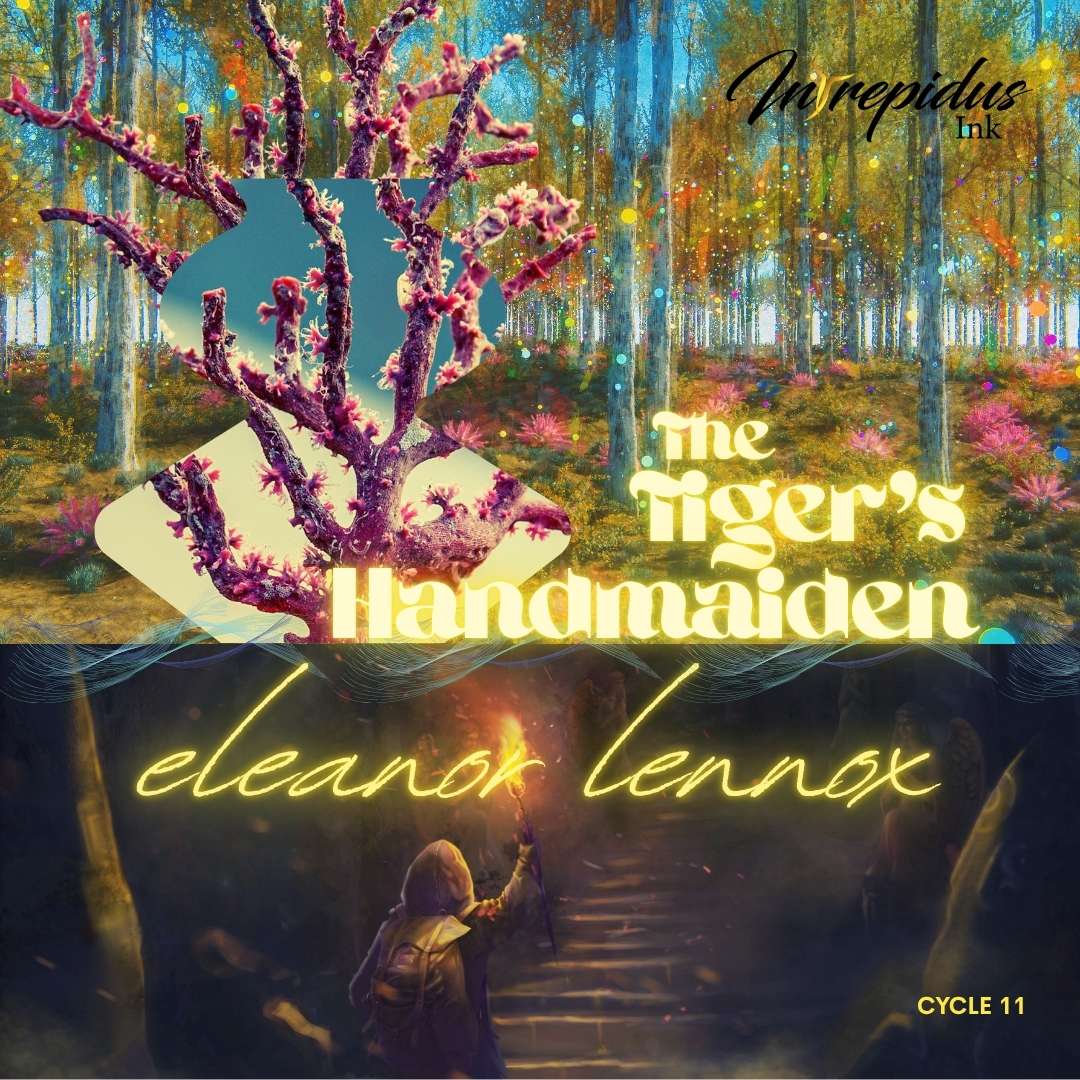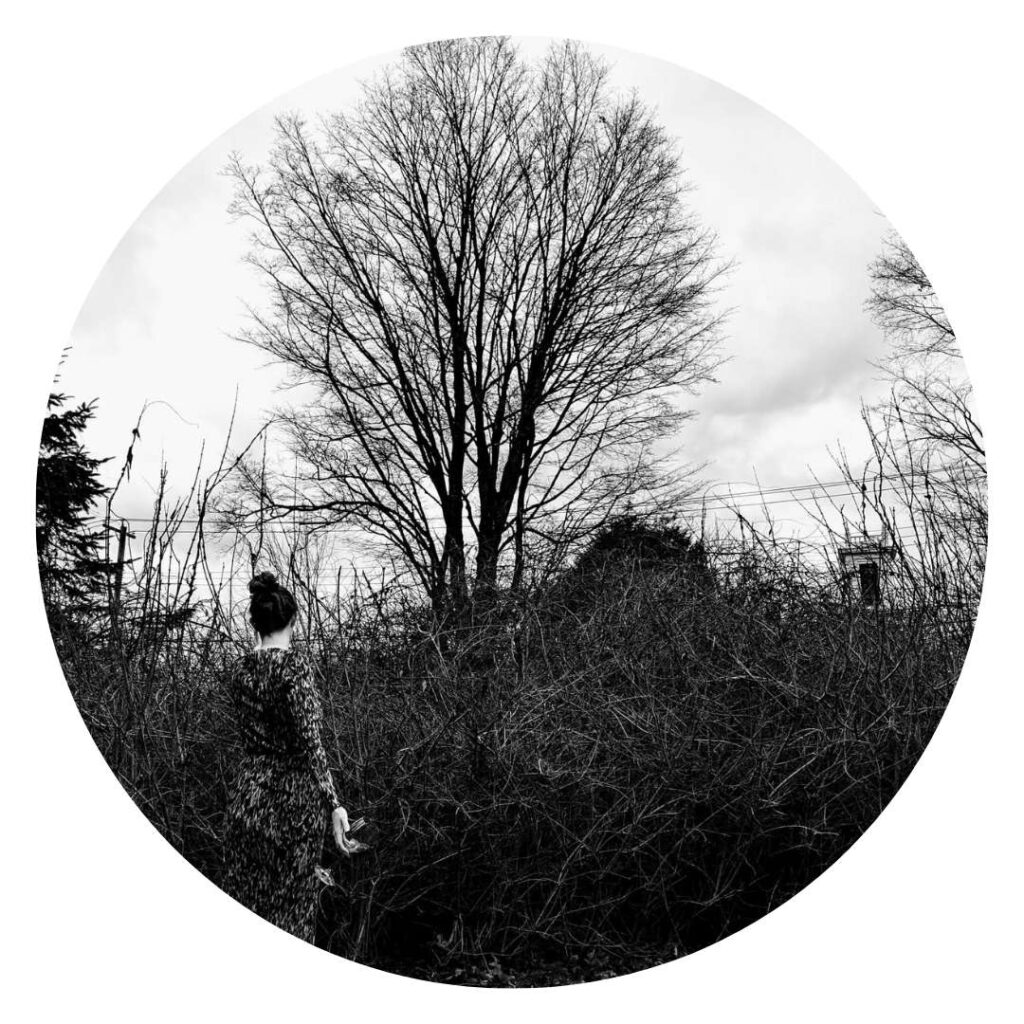

Speculative Fiction
Soren was only a boy when I met him, a boy lost in the Forest of Souls. Princess Savine had taken me there, her newest pikka, to remind me of what happened to handmaidens who displeased her. Her skin was as dusky and golden as the marigolds strewn across the royal table, for on these nights she would stalk the forest as her favorite familiar—a tiger.
I accompanied her as a crow, her magic leashing me to a tight circle above her. I was new to transfiguration, and though I’d imagined flying would be exhilarating, in truth I found it terrifying, with only air beneath my splintered feet. Perhaps I’d have enjoyed it if I were free to go where I wished, but instead I was perpetually crashing into invisible walls and falling back, stunned and breathless.
The boy’s footsteps were loud and clumsy—if we had not found him that night, another hunter of the forest would have. He looked to be about my age, around thirteen. His golden hair was matted with dirt, his eyes exhausted. When he saw the tiger, I thought he’d embrace death. But he stood up straight and stared her down.
I’d seen the princess commit countless atrocities already, although I’d only been in her service half a year. But there was something about that boy’s eyes, storm-gray and defiant—I couldn’t watch him be devoured. As she bared her pristine white teeth, I cawed loudly. She turned to me and growled. I ignored her despite my rising terror, and cawed relentlessly until the royal guards arrived. With a tiny pop, Savine transfigured back into her elegant human form, ebony hair cascading to her waist. I fell back to the earth with a whump, landing like the luckless red-headed girl that I was. Savine glared at me, fuming.
“I thought I saw a bear,” I said meekly.
“Damn you, Eevi,” she swore, and I wondered if I’d gone too far in ruining her fun, if she’d keep me there. For Sielu Forest wasn’t really a forest. It was a prison.
The souls of all my predecessors—the handmaidens who’d failed her—lingered in this copse of silver birch trees..
Soren and I received our punishments in the throne room. He was condemned to roam the kingdom forever, never allowed to stay in one village longer than a fortnight. A fitting punishment for a delinquent wanderer. I was given a lasting gift: a razor-thin scar that arced from my neck to my ear.
Four years passed. Every morning, I’d dress in the snowy white silks of a pikka and paint my face with flour and ochre. Whenever I spied my scar in the mirror, I thought of Soren. I hoped his life had turned out better than mine.
One morning, Savine was breaking her fast when news came of the fall of Agia Kios, a faraway kingdom by the sea. I listened carefully as I poured her wine, for I did not know the meaning of sea, and I’d learned long ago that most words unknown to me before coming to court never meant anything good. But the Elders didn’t say anything more about sea that day. Instead, they whispered and plotted about an old jar, an amphora. Agia Kios was a kingdom of strong magic, and its amphora, containing all the magical knowledge of its people, was missing from the sacked citadel. Savine longed for its dark secrets as some girls yearned for a new dress. She brooded in her bath for hours that night, as I rubbed her hair with anise and cinnamon. With a start, she stood in the tub.
“I know the answer,” she declared, water splashing onto the stone. “The wokou! I’ll call them to court—they’ll retrieve the amphora for me.”
“Who?”
“Wokou—pirates.” She sighed at my confusion. “Pirates! They steal things. On the sea.”
“What is the sea, Your—”
“You remember that dirty boy you stopped me from eating in the forest a few years ago?”
“Soren, Your Highness.”
“I hear he’s one of them now, one of the best.” She grinned, settling back into the bath. “Well, we’ll soon find out.”
One vernal night, the throne room was packed with courtiers and servants, minstrels and fools, and the tiny foxes that’d become the latest fashion. Savine stood. She wore a dark navy brocade with shoulders left bare, not a freckle or blemish in sight. Her cheekbones were high and cutting, lips dyed a dark red—a drop of blood in fresh-fallen snow.
“Wokou!” she bellowed.
The doors opened, and a motley group of rough and ragged men and women strode in, to gasps and craning necks.
And then I saw him—Soren.
He was tall now, his golden hair no longer dirty and tangled. He looked better fed, but there was still a leanness to him. Alert and edgy, a lynx waiting to pounce.
“I understand you’re all criminals and exiles, making your living as lowly scavengers,” Savine said. “But I will forgive your past crimes and restore your good names if you deliver me one token: the Amphora of Agia Kios.”
The leader, a silver-headed old rake with a long, dirty beard, bowed deeply.
“My princess, you honor us. But the amphora will have been taken out of the city by those who survived its destruction.”
“I know,” Savine responded. “Find the survivors. Kill them. Take it.”
“Simple and elegant,” the man chuckled. “As my princess commands.”
I found the wokou in the kitchen, eating a late supper before their journey. I scanned the group for Soren, but didn’t see him.
“I remember you.” His voice was at my back.
“The crow who became a girl. You saved me in the forest. You didn’t have that scar, then.”
“I got it that night.” I turned to face him, though I was unprepared to see his gray eyes so close, only inches away.
“Ah,” he said. “I’m sorry.”
“I’m not.”
He reached out and brushed the scar on my neck with his fingers. He looked into my eyes, and for the first time in my life, I wanted to be kissed. His lips came close to mine, but he stepped away before they could touch. He cleared his throat, his cheeks reddening.
“It suits you,” he said. “The scar. Shows the world who you are—a fighter.”
Over warm bread smeared with dark honey, we talked into the small hours.
“I’ve never seen the sea,” I confessed. “What’s it like?”
He smiled.
“You smell something fresh, and cold, and briny. Water freckles your cheek. You stick out your tongue and taste salt on your skin, in the very air. You hear waves booming and crashing on the beach, but it’s not frightening. It sounds like poetry, the oldest poetry there is.”
“Forgive me,” I interrupted. “But what is a wave?”
He paused. “You know the hills by Alikesi?”
I nodded. “I grew up not far from there.”
“Waves are like those hills,” he said. “Only smaller, and moving, always moving towards the shore. When they reach it, they break upon the sand, and that’s the sound you hear—the waves breaking.”
I shuddered. “It sounds horrible.”
“No, it’s beautiful. You’d love it.”
“But it’s all so far away,” I said. “I’ll never see a wave.”
“After we come back with this cursed jar for the princess, I’ll take you there.”
“The princess would never let me leave her service.”
He leaned in close. “Then we won’t tell her,” he whispered.
“I think—” I murmured, for I’d never shared a hope before,“—I’d like that very much.”
He ran his fingers gently over my scar and looked into my eyes. He smiled at me. He didn’t smile at a pikka in white silks, or a bastard’s daughter. The me that existed beyond name, function, lineage—he had seen her and smiled.
Soren left with the Wokou the next morning.
The Night of Broken Candles came and went three times before he returned. I grew used to being a crow and no longer tested invisible walls. I killed and skinned hundreds of haisunäätä to make Savine’s winter capes. I stroked the silvern skins of the birch trees, my pikka sisters, and secretly tended their wounds.
One morning, not long after my seventeenth birthday, I woke to the cold, jubilant toll of bells, calling us to court. My stomach roiled with sick anticipation as I walked the pale marbled halls leading to Savine’s chambers.
I found Savine buzzing with excitement, eating lavender pasties with abandon, and pressing a terrified cleaning serf into a jig.
“Eevi!” she shouted at my arrival. “The greatest news of all—that wokou boy has been spotted on the approach to the castle. He’s found it!”
At midday, the full court stood assembled in the throne room, silent with anticipation for Soren’s arrival. As he arrived, ragged and gaunt, the crier called out to the assembled, “Soren of Alikesi!”
Soren stood straight, casting a disinterested glance around the room at our eager, straining faces. His own was pale and laced with cuts. No one followed behind him, and a murmur rippled through the crowd at his returning alone. But Savine made no mention of Soren’s missing companions, nor did he. Her eyes were fixed on the ancient green amphora, coral growing out of its terracotta mouth, that Soren pulled out of a dirty burlap bag.
Savine bade me collect it. As I took the amphora from him, I felt the thrum of an immense power, an unspeakably old magic, and I knew in my bones what I must do.
I looked into Soren’s eyes.
“I’m sorry,” I whispered.
For as soon as I grasped the amphora, I realized two things: Savine must never have it. And I would never go to the sea.
I threw the amphora on the ground. As Savine screamed, I felt a flicker of something like joy.
A blue mist arose from the amphora’s broken pieces, carrying within it a ghostly chorus. Before I could grasp the words, the mist fled out the open window, into the night.
Savine grabbed my neck. The last thing I heard was Soren shouting my name.
I woke in Sielu Forest, my body a birch tree. For a time, my only visitor was Savine, who’d come now and then to strip my bark and watch my branches shake in agony—or if not me, one of my sisters. Sometimes she would sit in our shade and confess her secrets, for she knew we’d never have tongues to tell on her again.
Then one day, a different visitor approached—
Soren.
“How did you know it was me?” I asked him, weeping, though I knew he’d only hear the rustling of leaves.
His fingers ran the length of something long bisecting my trunk, and suddenly I realized the answer—he knew me by my scar.
“Find your way out of here,” he whispered, cheek pressed against my trunk. “You know her magic better than anyone. Find your way out. Find me.”
He stepped back and looked at me.
“I’ll be waiting by the sea.”
Winter came and went. Spring turned to summer, winter followed autumn again. Eventually, I stopped counting seasons and let them wash over me, like the wind, like the sighs of my sisters. I learned to read the dictionary of shadows, to find drops of light and reservoirs of water. I pored over memories of Savine’s magic. I reached out to my sisters through our roots entwining, and we shared our understandings. But we couldn’t find a way out. At night, I dreamt of Soren, waiting by the sea.
One summer, a fire ripped through our forest, felling many trees. In the distance, I could see hills.
A word came to mind that Soren once told me, a word that felt like a riddle, a myth. Waves.
It reminded me of a piece of magic I’d witnessed in my first days as a pikka, powerful water magic that Savine used to destroy a village. Magic of a kind that a princess kept safe and close, more precious than any diadem. But I had been Savine’s shadow longer than any of them, as close as her own skin. When I saw those hills, I remembered the words.
That day, I turned the hills into waves. Water flooded the forest, and before the new moon returned, our roots had rotted, and we were free.
I said goodbye to my sisters, all bound for home and half-forgotten villages. I headed for the sea.
A woman once more, naked and alone, I trekked through forests so thick they hid the North Star. But I did not need stars for direction anymore. A tree knows north from where the moss grows thickest on her trunk.
And then I reached it. Soren was right—the sea was a wild prairie of rolling blue hills. But he never told me that when you looked at it, you became whole again.
I walked the beach for hours, my toes delighting in the grit of sand, salty winds tickling my bare legs.
I saw a man walking towards me–a tall, lean man, with dark gray eyes like a summer storm. His hair was white, and his face was lined with wrinkles.
Soren.
He took my old, gnarled hand and kissed it.
“My love,” he said. “How do you like the sea?”
Author Bio

Eleanor Lennox lives in New England. Her work has appeared or is forthcoming in Factor Four, Radon Journal, Flash Fiction Online, 34 Orchard, and others. Find her online at eleanorlennox.com or on Bluesky (@eleanorlennox.bsky.social).

